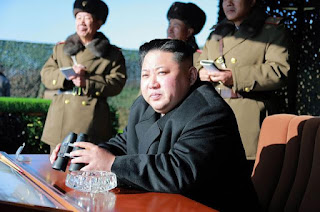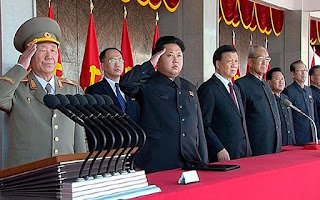Exploring the Path to Peace in the Korean Peninsula
Exploring
the Path to Peace in the Korean Peninsula
By E. Stanley Ukeni
After about a couple of weeks
of escalating rhetoric between Washington and Pyongyang, which seemed to many
political pundits like the situation was spiraling out of control, a path to a
diplomatic de-escalation of the crisis suddenly began to open up.
The decision by the North
Korean leader, Kim Jong-un, to shelve his earlier plans to launch a number of
intermediate-range ballistic missiles into waters near Guam—the United States
territory in the Western Pacific, was a welcomed gesture by President Trump.
With this pullback from a
dangerous brinkmanship, it appears as though the crisis between the United
States and North Korea has abated—reducing the danger of an unintended spiral
into war by both Washington and Pyongyang. This is a welcome development, and a
sure win for the advancement of global peace and security.
Although more blustering
rhetoric has been coming out of North Korea in recent days, such is to be
expected from the hermit kingdom. After all, the United States and South Korean
military forces are proceeding with for their annual ten days joint large-scale
military exercise.
Historically, the North Korean
government has persistently denounced the annual air, land and sea joint
military maneuvers by the United States and South Korea—code-named Ulchi-Freedom
Guardian, with brash and bellicose language. So a belligerent response from Pyongyang
is to be anticipated for the commencement of the war games.
It’s no surprise then that the
North Korean’s decided to fire-off a few short range ballistic missiles on Saturday as a show of
protest of the war games. Let’s hope that the more recent missile launches on
Saturday does not ratchet up the rhetoric once again. I think it’s OK to allow
then a little room to vent.
What’s noteworthy here is that
although the regime in Pyongyang has issued inflammatory rhetoric as it has
done in the past, the regime has not been quite as belligerently threatening to
the United States as before. This is a promising development that would lay the
foundation for multilateral dialogue aimed at bringing lasting peace to the
Korean peninsula.
I am reasonably confident that
there is a chance for peace here, even as the war of wars between Washington
and Pyongyang goes on. My confidence is born of the fact that the leaders of
China, Russia, South Korea and Japan—the countries that would be most affected
if a major war breaks out in the Korean peninsula, have all expressed a strong interest
in pursuing a return to diplomatic negotiation.
In a phone conversation just
days ago, the Chinese Foreign Minister, Wang Yi, impressed on his Russian
counterpart, Sergei Lavrov, the need for both countries to coordinate their
effort with the view of preventing a major war breaking out near their
respective borders. This information is based on statement from sources within
the Russian and Chinese foreign ministries.
In pursuant to de-escalation of
rhetoric, the Chinese side issued a statement stating that, “The urgent task is
to slam the brakes on the mutually provocative words and actions between North
Korea and the United States…cool the tensions and prevent a crisis from
breaking out this August.”
The message from the Russians
stated that, “Military adventure and threats of force are unacceptable.”
The United States’ Secretary of
States, Rex Tillerson—indicating US willingness to seek means of reinitiating
the stalled peace negotiations with the North Koreans, said, “We continued to
be interested in finding a way to get to a dialogue.”
Recent statements from the new
South Korean President, Moon Jae-in, seems to indicate that the government in Seoul
has little appetite for war in the Korean Peninsula.
In a nationally televised news
conference, President Moon Jae-in affirmed, “The people worked together to
rebuild the country from the Korean War, and we cannot lose everything again
because of war. I can confidently say there will not be a war again on the
Korean Peninsula.”
That is a ringing endorsement
of peace in my opinion—and a sure sign that all parties are committed to
finding a peaceful solution to the North Korean challenge that preclude to use
of military force.
And in a bid to reassure
regional powers of United States’ intentions of finding a diplomatic, rather
than military solution to the Korean crisis, the Chairman of the Joint Chiefs
of Staff, General Joseph F. Dunford Jr., travelled to Tokyo, Seoul and Beijing
for consultations with leaders of those countries.
In China, General Dunford had
an official consultation with his Chinese counterpart, General Fang Fenghui—the
Chief of the People’s Liberation Army’s joint staff department, along with
another top Chinese general, Fan Changlong, and a top Chinese government
foreign policy adviser, Yang Jiechi.
U.S. Chairman of the Joint
Chiefs of Staff Gen. Joseph Dunford, center left, chats with President Xi
Jinping, center right, during a meeting at the Great Hall of the People in
Beijing, Thursday, Aug. 17, 2017. (AP Photo/Andy Wong, Pool)
During their meeting, General
Fan emphasized a Chinese government insistence that military action be ruled
out in dealing with the Korean crisis. He insisted that China will only accept
a negotiated settlement as the only effective means of dealing with the
situation on the Korean Peninsula—this is according to a reported statement
from China’s defense ministry.
General Dunford was quoted, by
journalists in Beijing, to have said that, “We are seeking peaceful resolution
to the crisis right now.”
Apparently, while the rhetoric
between the US President and the North Korean leader was heating up, a
back-channel diplomatic discussion was taking place. These initial exploratory discussions
were probably aimed at exploring acceptable perimeters for any future
negotiations.
Obviously, a path to a
negotiated solution to the Korean crisis will be difficult, but the alternative
would be disastrous for our world. There is no doubt in my mind that a peaceful
resolution to the Korean crisis is the only sane solution to consider by all
sides.
In my opinion, any calculus
that leads to war in the Korean Peninsula is one that will set human progress
back a couple of centuries. Although there are occasions when a just war may be
necessary to preserve liberty and freedom, I am of a firm opinion that peace is
the acceptable solution here.
If you like this article, consider becoming a supporter. We desperately
need your support right now. Thank you in advance.
Authored by E. Stanley Ukeni, ©
2017. All Rights Reserved. This material and other articles or stories posted
on this blog site may not be reproduced, published, broadcast, rewritten or
redistributed, in whole or in part, without prior expressed written permission
from the author, E. Stanley Ukeni.
You are invited to follow E.
Stanley Ukeni on twitter at; @EzStan . You’re equally invited to follow him on
google+. Oh yeah, don’t forget to subscribe to this blog Site. Thanks.
Photo
Credits: AP






Comments
Post a Comment